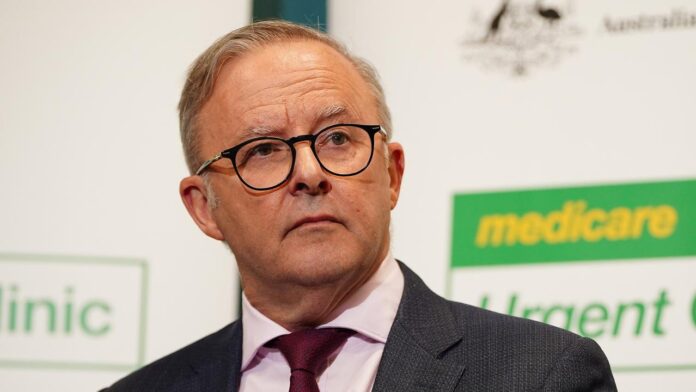[ad_1]
Interest rates risk going even higher unless the Albanese government works with the states to get the nation’s multi-billion dollar spend on roads, rail and bridges in order, the International Monetary Fund has warned.
In its annual Australian “Economic Health Check”, the fund said while Australia was likely to avoid a recession, the “uncoordinated execution of the large pipeline of infrastructure projects across Australian states could result in price pressures.”
Since May 2022, the Reserve Bank has aggressively raised borrowing costs, hiking interest rates to a 12-year high of 4.35 per cent, as it attempts to cool the economy and tame inflation.
The fund praised the Albanese government’s decision to return soaring tax collections to the budget bottom line, which was helping ease inflation, but said it needed to improve the efficiency of new expenditure to share the “burden” of lowering prices.
While spending to solve Australia’s “infrastructure deficit” was welcome, it also threatened to stoke inflationary pressures, meaning more mortgage pain for household borrowers.
“The absence of adequate fiscal-monetary co-ordination to account for such spillovers could result in an increase in inflationary pressures due to inadequate fiscal consolidation, necessitating further monetary tightening to contain inflation,” it said.
An audit of the Commonwealth’s 10-year $120 billion infrastructure investment pipeline released in November, found some 700 projects had blown out by a staggering $32.8bn due to soaring labour and material costs.
But the Washington-based institution also warned household borrowers were already bearing the brunt of higher interest rates, amid lower real wages and depleting savings.
“Higher policy rates have primarily affected lower income households with mortgages … adding to their hardship amid high inflation and cost of living crisis.”
Respite for households, in the form of lower interest rates, was unlikely anytime soon, the report said.
“Given still high and broad based non-tradeable and services inflation, a still-positive output gap, and tightness in [the] labour market, there is no scope for a cut in the cash rate in the near term, despite expectations among some market participants,” it said.
The IMF also took aim at the blistering pace of overseas migration, which had contributed to a chronic shortage of rental properties.
“Rents have also increased at a very fast pace, with strong growth in immigration following the post-Covid reopening adding to pressures, given housing shortages.”
The findings follow a two-week mission to Australia by IMF officials, who met with the RBA, Treasury, businesses and economists in late November and early December.
IMF raises growth forecasts
The IMF expects the Australian economy to expand by just 1.4 per cent this year – up from its previous October forecast of 1.2 per cent.
The estimate is more pessimistic than the RBA’s, whose economists expect Australia’s GDP to expand by 1.75 per cent in 2024.
Australia’s tight jobs market will gradually loosen, the IMF forecasts show, with the jobless rate set to climb to 4.8 per cent, up from its current level of 3.9 per cent.
At the same time, headline inflation is expected to continue to moderate, reaching the RBA’s 2 to 3 per cent target band by 2026, slightly later than the central bank’s late 2025 timeline.
In 2024, consumer prices will average 4 per cent, roughly in line with the RBA’s official forecasts.
Echoing warnings from the RBA governor Michele Bullock that Australia’s inflationary pressures were being driven by increasingly “homegrown”, the report warned that sticky prices in the labour-intensive services sector would fuel future price growth.
“While external price pressures have abated, leading to an easing in goods inflation, persistence in non-tradeable prices driven by demand pressures will keep inflation elevated,” the IMF said.
Treasurer Jim Chalmers claimed the IMF’s report was an endorsement of the government’s economic credentials.
“There is no shortage of challenges in the economy,” Dr Chalmers said, adding that a combination of inflation, higher interest rates, natural disasters and global uncertainty were weighing on GDP growth.
“But this report confirms Australia comes at these from a position of genuine economic strength.”
Shadow treasurer Angus Taylor said the report underscored the financial hardship Australian households were continuing to suffer.
“Most damning, the IMF has called out Labor’s weak budget management and migration policies as making inflation worse,” Mr Taylor claimed.
[ad_2]
Source link


